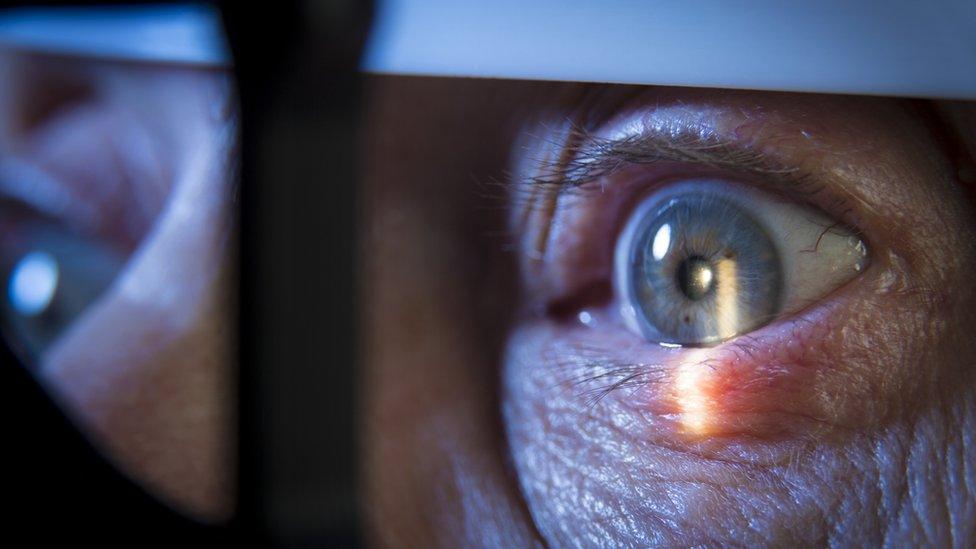Eye risk from 'overstretched NHS'
- Published
Elizabeth Araj, who has macular degeneration: "You have to really fight for your corner"
Eye specialists say hundreds of patients suffer irreversible sight loss every year in England because services are overstretched and under-resourced. The president of The Royal College of Ophthalmologists, Prof Carrie MacEwen, writing for the BBC's Scrubbing Up, warns the NHS is struggling to keep up because of a "perfect storm" of increased demand, caused by more eye disease in an ageing population which requires requiring long term care.
She says the current treatment targets fail to reflect the critical importance of follow-up appointments, which may be delayed for months or even years.
"Many eye diseases which can cause sight loss are more common in older people and our aging population means the demand on ophthalmology, like all areas of healthcare, is increasing like never before.
Hospital attendances have increased year on year in the UK, with over 100m outpatient appointments made in England alone during 2013-14, of which nearly 10% are for eye care, external.
Common eye conditions which were previously untreatable, such as age-related macular degeneration, can now be treated successfully, but this adds to the demand on eye clinics.
Efforts to create more care in the community show no evidence of an actual reduction in demand for care in hospitals.
With an increase of up to 30% in eye clinic attendances over the last five years, we can no longer ignore the pressure mounting in hospital eye services.

Hospitals have targets - with fines if these are missed - to ensure patients avoid long waits for care. But these targets apply to 'new' patient referral, meaning this system can and does distort clinical priorities.
In reality, the increasing demand for eye clinic appointments comes from existing patients which chronic eye diseases, such as macular degeneration, glaucoma and diabetic eye disease.
These "follow-up" patients are the most vulnerable and at the greatest risk of irreversible sight loss. These conditions require long-term repeat appointments for close monitoring and care.
And it's these follow-up appointments that are more likely to be postponed or lost in the system for months - and sometimes years - to accommodate new referrals in already over-subscribed clinics.
There are no targets for follow-ups, meaning data is not routinely gathered. This makes it difficult to determine the magnitude of the problem.
However, a search undertaken by the National Reporting and Learning System, external (NRLS) identified nearly 500 incidents describing loss or deterioration of vision from such delays between 2011 and 2013 in England and Wales.

The Royal College of Ophthalmologists, external is carrying out a national study to identify patients who have come to harm due to hospital-initiated delays for follow-up appointments.
This study has not yet formally reported, but preliminary results indicate that across the UK at least 20 patients per month suffer severe visual sight loss from such delays.
Ophthalmologists want what is best for their patients and whilst many hospitals are taking positive action to deal with these delays, the response to the problem is variable across Britain.
The NHS in Scotland and Wales has been working with ophthalmologists to address these problems, but the situation in England is much more fragmented.
Solutions include recommended guidelines to optimise efficient care; the use of expanded skills and roles of other specialist eye staff such as ophthalmic nurses, optometrists and orthoptists; increasing networks between primary and secondary care.
Finally, and importantly, giving patients a voice by improving understanding of their condition and the importance of their follow-up appointments being kept within the time recommended by their doctor.
These recommendations may be seen as difficult, as often there are restricted resources and limited time for clinicians to work with those across the whole network of care, community and commissioners to develop strategies which can meet the ever increasing number of patients coming through clinics.
At the same time there should be a review of current targets to encourage more equitable care, and follow-ups are recognised as equally important to patient care.
A key part of the problem is lack of data. Data collection will identify patients who might otherwise fall between the cracks and enable those managing service provision to be able to plan more effectively.
If these solutions are not urgently forthcoming, many hundreds more will needlessly experience sight loss."